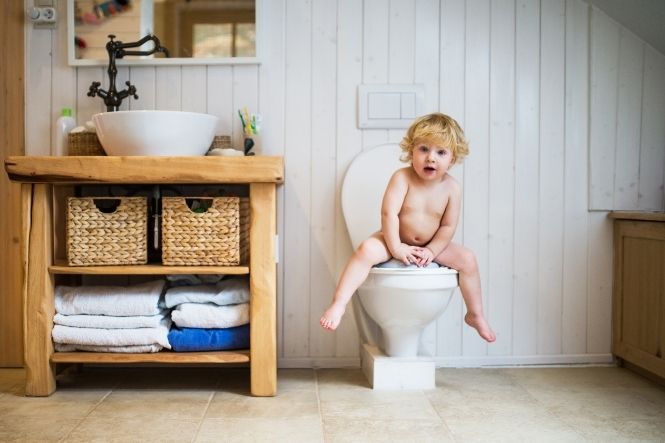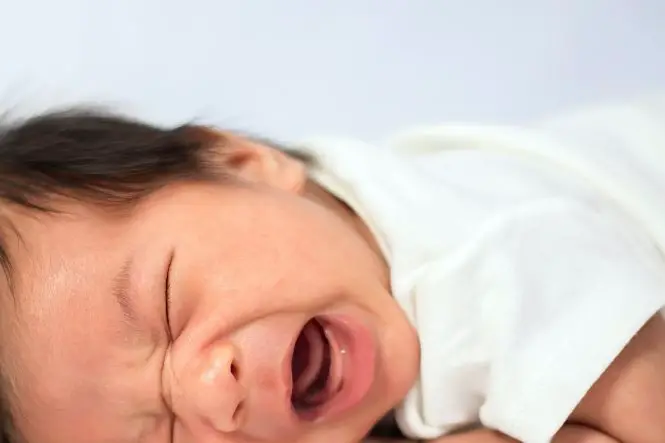Read this article to learn why your toddler has pale poop after a tummy bug and some of the treatments to help alleviate it
Your toddler having white stools after an illness is usually the result of taking large doses of certain antidiarrheal drugs. It can depend on which illness they had before the stools turned white. However, it can also signify some other serious medical condition such as liver disease or a blocked bile duct. You should speak to a doctor for medical advice if you’re concerned.
If your childhood took a lot of medication to deal with diarrhea because of a stomach illness, then that could be part of the reason that their stools are turning white even after the disease has passed. However, you should also look at whether or not there is a chalkiness to their stools as this could lead to other conditions.
In most cases, with pale stools, there is some kind of underlying medical condition that you should consult the doctor about. It can be unclear what disease is underlying to cause the peeling of your toddler stools. It’s best to note what kind of changes you are seeing and take those to your toddler’s doctor for a more specific diagnosis.
Table of Contents
Should You See a Doctor for Toddler’s Pale Poop?
You should consult your toddler’s doctor if you find white stools from your toddler after diarrhea or any other kind of stomach illness. It could be because you’re taller, taking a hefty dose of drugs to deal with the stomach illness and the white stools are a side effect. However, it can also be a sign of a more severe disease.
It would be best if you went to see a doctor within a day of noticing pale stools from your toddler. Also, note any other symptoms they may be experiencing, such as a yellow tint to their skin, dark urine, or fever, because this could help narrow down exactly what the issue is. A doctor will give you a precise diagnosis of the problem.
However, you don’t need to panic right away as it very well may be that your toddler is experiencing pale stools as a response to trying to get the diarrhea drugs out of their system. Keep an eye on them over the next 24 hours and any symptoms you might see along with the different colored stools. If it continues after 24 hours, see a doctor immediately.
Why a Toddler Pale Poop After Tummy Bug
One of the most common reasons your toddler stools could turn white is a new medication introduced to their body. This is usually due to drugs for treating the stomach illness that your toddler’s body doesn’t know how to react to it yet. However, it’s essential that you talk to your toddler’s doctor as there may be some other issue at hand.
If your toddler is on the other side of having some kind of stomach illness, there are going to be some lasting effects for the next few days as they completely recover. You may need to look into what kind of medications they were taking and other symptoms that they are having. Look for signs that don’t match the symptoms of the previous stomach illness.
The following are some of the diseases that may be underlying your toddler’s health that are causing white stools. Keep in mind that these are only broad stroke symptoms and an idea of the treatment. You should consult a doctor if you want to get a proper diagnosis.
Dietary or Medication Changes
Before you start to panic about your toddler having some kind of severe disease, it isn’t unusual to have lighter-colored stools because of medications or specific dietary choices. Antacids with aluminum hydroxide can cause lightning of stools and other antibiotics. Barium, a product used in x-rays to better visualize the intestinal tract, can also cause pale stools.
If your toddler has recently had a stomach bug of some kind, then chances are that they have been taking medication to treat it. Because that medication is not something that usually has as part of their digestive system, it could be that something in the medicine is causing temporary lightning of the stools. You may want to talk to a doctor about whether or not it’s possible.
This is especially true if your toddler has needed to get x-rays on their abdomen because of the previous illness. They would probably have to take in some kind of substance to help make things are more visible in their intestines and stomach region, which would then affect these stools as the chemical exits their body. Ensure that you’re talking to the doctor before any medical procedures.
Blocked Bile Duct
The pale stool could be a sign that your toddler has a blocked bile duct if the stool has a clay-like consistency. Bile is the liver’s digestive fluid that helps break down fats, and bile helps eliminate cholesterol and waste products and typically gives stools a brownish color.
If your toddler’s stools are a pale or white color, it could be because of a bile duct blockage, making it so that the small intestine can’t have access Violet needs to help break down Foods. some of the conditions that can cause a blockage are:
- Gallstones
- Tumors in the bile ducts or pancreas
- Bile duct inflammation
- Enlargement of the lymph nodes which I found in the liver
- Bile duct cysts
- Parasites
Other symptoms to look out for that there is some kind of blockage of the bile duct are:
- Jaundice, which is a yellowing of the skin and the whites of the eyes
- Abdominal pains, specifically in the upper right side
- Nausea
- Vomiting
- Fever
- Dark urine
It’s difficult to pinpoint a specific treatment for a bile duct blockage because it will depend on the initial cause. For example, if gallstones are an issue, they may be treated by undergoing surgery to remove the gallbladder. For a parasite, it may be that your doctor prescribes a specific medication to treat it.
Liver Disease
Another possibility for white stools can be a connection to liver disease. This is an even harder disease to pinpoint, as many reasons can cause liver disease. Some of the causes are:
- Infection
- Hepatitis A, hepatitis B, and hepatitis C
- Cancer or other growths
- Liver cancer
- Bile duct cancer
- Liver adenoma
- Genetics
- Alpha-1 antitrypsin deficiency
- Hemochromatosis
- Hyperoxaluria
- Oxalosis
- Wilson’s disease
- Immune system abnormality
- Autoimmune hepatitis
- Primary biliary cirrhosis
- Primary sclerosing cholangitis
Some of these elements may connect to the parents of the infant or other lineages. If any of these diseases have come up in your family before then, you might want to consider speaking to a doctor about the possibility. Other conditions can cause liver disease, but it will depend on the environment end upbringing of your child.
Some symptoms to look for in liver disease are:
- Jaundice, which is the yellowing of the skin and the whites of the eyes
- Abdominal swelling and pain
- Chronic fatigue
- Nausea
- Vomiting
- Swelling of the ankles and legs
- Dark urine
- Bruising of the skin
- Loss of appetite
The treatment for liver disease is usually medication or surgery. However, lifestyle changes can also help with liver disease, depending on what the initial cause is. Suppose you’ve noticed a pale stool from your toddler along with any of the above symptoms. In that case, you should immediately talk to a doctor about the possibility that your toddler has some underlying medical issue.
What is the Treatment for White Poop in Toddlers?
Treatment will require that you first get a firm diagnosis of what is causing the white stools. This usually means an abdominal x-ray or ultrasound. Your toddler may need blood tests to check the bilirubin levels. In most cases, the only treatment for liver disease is to have an operation to connect the liver to the small intestine going around the abnormal ducts.
If it is something linked to a medication or other dietary needs, the treatment may involve finding a replacement medication or a better way of managing their nutritional needs. Some medicines are more difficult to replace than others, so it may take some trial and error to find something that works for your toddler. Dietary needs can be a little bit simpler but will still require patience.
Before you can get proper treatment for your toddler for anything that might be going on with their liver or other abdominal issues, you’re going to have to get an appropriate diagnosis. This usually means some kind of X-ray or ultrasound on the abdomen. However, ultrasounds are more common because they have a blessed health impact than X-rays do.
Other scans will look at the bile ducts and gallbladder to see that they’re working correctly. Blood tests are also probably something your toddler would have to undergo to pinpoint precisely where the ailment is. In the case of any causes of jaundice, they may need to undergo a liver biopsy.
Conclusion
Your toddler having pale stools after some kind of stomach illness can result from taking medications to counter diarrhea. However, it can be a sign of other underlying medical conditions such as liver disease and blockages in their digestive tract. Talk to your toddler’s doctor immediately so that you can get a more specific medical diagnosis and possible treatment options.






